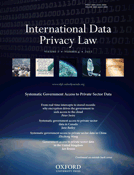
International Data Privacy Law
Scope & Guideline
Leading the Conversation on Data Protection and Privacy Rights
Introduction
Aims and Scopes
- Cross-Border Data Transfers:
Explores the legal challenges and frameworks governing the transfer of personal data across national borders, especially in the context of varying privacy laws. - Regulatory Compliance and Enforcement:
Analyzes the enforcement mechanisms of privacy regulations such as the GDPR, examining case studies and national implementations. - Technological Implications on Privacy:
Investigates how emerging technologies, including AI and facial recognition, impact personal privacy and the regulatory landscape. - Cultural Perspectives on Data Privacy:
Offers comparative analyses of data privacy laws and user perceptions from different cultural contexts, highlighting global diversity in privacy approaches. - Children's Privacy Protection:
Focuses on the legal frameworks and challenges surrounding the protection of children's personal data in various jurisdictions. - Health Data Privacy:
Examines the specific challenges related to privacy in health data, especially in the context of digital health technologies and public health initiatives.
Trending and Emerging
- Impact of AI and Machine Learning on Privacy:
There is a growing focus on how AI and machine learning technologies intersect with data privacy laws, particularly regarding automated decision-making and data minimization. - Global Health Data Privacy:
The COVID-19 pandemic has catalyzed discussions around health data privacy, particularly in relation to contact tracing and public health surveillance, highlighting the need for robust legal frameworks. - Data Localization Policies:
Emerging debates around data localization reflect a trend towards national sovereignty over data, with discussions on the implications for international data transfers and compliance. - User Perceptions and Transparency:
Research is increasingly exploring user perceptions of privacy, focusing on transparency in data practices and how this affects trust in digital services. - Regulatory Innovations and Adaptations:
A trend towards examining innovative regulatory approaches and adaptations in response to rapid technological changes and evolving privacy challenges is evident.
Declining or Waning
- Traditional Privacy Concepts:
There appears to be a gradual decline in discussions centered on traditional notions of privacy, as the focus shifts towards more complex issues surrounding data usage and technology. - National vs. International Data Laws:
While the interplay between national and international laws was previously a key focus, there seems to be a reduced emphasis on this theme as specific compliance strategies take precedence. - General Data Protection Regulation (GDPR) Basics:
Basic discussions around GDPR compliance are becoming less frequent, as the discourse evolves towards more nuanced applications and implications of the regulation. - Historical Legal Precedents:
Research that merely revisits historical legal precedents in data protection is waning, with more emphasis now placed on current challenges and future directions. - Static Legal Frameworks:
The exploration of static legal frameworks without considering their dynamic interactions with technology and societal changes is decreasing in favor of more adaptive discussions.
Similar Journals
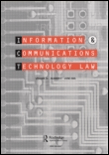
Information & Communications Technology Law
Exploring the Frontiers of ICT Legal ScholarshipInformation & Communications Technology Law, an esteemed journal published by Routledge Journals, Taylor & Francis Ltd, serves as a vital platform for the dissemination of critical research and analysis in the intersecting fields of law, communication, and computer science. Established in 1992, this journal has continuously evolved to address the dynamic landscape of information technology and its legal implications, maintaining a significant H-Index that reflects its scholarly impact. With a notable impact factor that places it in the second quartile for communication and law disciplines, and in the third quartile for computer science applications as of 2023, it ranks impressively within the Scopus Metrics—highlighting its relevance and reach among global academia. Covering vital topics from data privacy to intellectual property rights in the digital age, the journal appeals to researchers, practitioners, and students alike by offering insightful articles that explore contemporary issues and emerging trends within ICT law. Although it does not currently offer open access options, its comprehensive articles and reviews are indispensable for anyone seeking to understand the complexities of technology regulation and legal frameworks.

Northwestern Journal of International Law & Business
Connecting Academia with the Global Business LandscapeThe Northwestern Journal of International Law & Business, published by the NORTHWESTERN UNIVERSITY SCHOOL OF LAW, serves as a critical platform for scholarly discourse at the intersection of law and international business. With an ISSN of 0196-3228, this journal covers a diverse range of topics relevant to practitioners and academics alike, encouraging in-depth analysis and debate surrounding contemporary issues in international legal frameworks and business practices. While currently categorized in the Q4 quartile across multiple fields including Business and International Management, Law, and Strategy and Management, it presents a unique opportunity for contributors to elevate their work within an evolving landscape. The journal's accessibility options cater to a variety of readers, fostering a rich exchange of ideas among researchers, students, and professionals dedicated to the advancement of international law and business scholarship. By publishing rigorous research and original insights, the Northwestern Journal aims to influence the academic community and inform policy-making processes worldwide, thus proving its value in the global academic discourse.

IOWA LAW REVIEW
Transforming legal challenges into scholarly solutions.IOWA LAW REVIEW is a prestigious legal journal published by the University of Iowa College of Law, dedicated to advancing the discourse in the field of law. Since its inception, this journal has become a vital resource for legal scholars, practitioners, and students, committed to publishing rigorous and thought-provoking articles that address contemporary legal challenges. With a strong emphasis on contributions from a diverse range of legal fields, including constitutional law, criminal justice, and property law, the IOWA LAW REVIEW maintains a Q1 ranking in law, reflecting its significance and influence on legal scholarship globally. While the journal is not currently open access, it provides critical insights and perspectives that are essential for understanding the evolving landscape of law. Additionally, with its ranking of #314 out of 1025 in the Scopus database, the journal demonstrates a high impact within the legal community. Scholars and practitioners alike are encouraged to engage with its scholarly articles, as they not only highlight key legal issues but also propose innovative solutions to complex societal problems.

Revista Boliviana de Derecho
Fostering Critical Perspectives on Legal Issues in Latin AmericaRevista Boliviana de Derecho is a prominent academic journal dedicated to the exploration and dissemination of legal studies, particularly focusing on the issues pertinent to Bolivia and Latin America. Published by Inst Derecho Iberoamericano, this journal serves as a vital platform for researchers, legal professionals, and students to engage with contemporary legal theories and practices. With its ISSN 2070-8157 and E-ISSN 2706-8080, the journal adheres to high academic standards and aims to contribute significantly to the advancement of legal scholarship in the Spanish-speaking world. Although it operates within a closed access framework, its publications are crucial for understanding the evolution of legal frameworks and their implications in a rapidly changing society. By providing a convergence of diverse legal opinions and analyses, Revista Boliviana de Derecho remains an essential resource for anyone invested in the field of law.
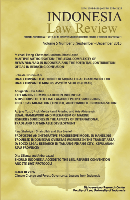
Indonesia Law Review
Exploring the Complexities of Indonesian LawIndonesia Law Review is a premier open-access academic journal dedicated to advancing knowledge in the fields of law and social sciences, with particular emphasis on the Indonesian legal landscape. Established by the Indonesian Law Review, this journal has made significant strides since becoming open access in 2014, ensuring that research is freely available to a global audience. Based in Depok, West Java, the journal seeks to foster scholarly discourse on legal issues pertinent to Indonesia, while also contributing to the broader field of education and social sciences. With its current Scopus rankings placing it within the top tiers of law and social sciences, including a Q3 categorization in law and a Q4 classification in education and miscellaneous social sciences, the **Indonesia Law Review** serves as a vital platform for researchers, professionals, and students to disseminate their findings and engage with contemporary legal dilemmas. The journal is committed to providing a robust forum for innovative legal scholarship and is an essential resource for anyone seeking to understand the complexities of law in Indonesia and beyond.
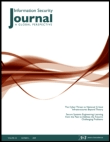
Information Security Journal
Elevating Standards in Computer Science Applications.The Information Security Journal, published by Taylor & Francis Inc, is a pioneering platform dedicated to disseminating knowledge in the realms of information security, computer science applications, and information systems management. With an ISSN of 1939-3555 and an E-ISSN of 1939-3547, this journal has successfully carved its niche within the Q2 quartile of the 2023 rankings for both Computer Science Applications and Information Systems and Management, while also being recognized in Q3 for the Software category. Located in the United Kingdom, the journal has been committed to advancing research and fostering innovation from 2008 through 2024, making it an essential resource for academics and professionals alike. With a significant Scopus ranking in its fields—placing 43rd out of 148 in Decision Sciences and 271st out of 817 in Computer Science Applications—the journal stands as a vital source of interdisciplinary insights. Although it does not currently offer open access options, the quality of publications and the journal's dedication to the field ensure that it remains a compelling choice for researchers seeking to publish their findings or stay abreast of current developments in information security.
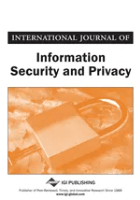
International Journal of Information Security and Privacy
Transforming Ideas into Actionable Security SolutionsInternational Journal of Information Security and Privacy is a pivotal resource for scholars and practitioners in the rapidly evolving field of information systems. Published by IGI Global, this esteemed journal, identifiable by its ISSN 1930-1650 (E-ISSN 1930-1669), explores critical aspects of information security and privacy, focusing on innovative approaches, technologies, and best practices that safeguard data in an increasingly digital world. Since its inception in 2007, it has contributed significantly to academic discourse, addressing major challenges faced by organizations and individuals alike. Although it currently ranks in the Q4 quartile and occupies the 249th position out of 394 in the Scopus computer science category, the journal has a commendable reach and continues to attract impactful research. As part of its commitment to advancing knowledge, the journal encourages contributions that deliver actionable insights, making it an ideal platform for researchers, professionals, and students interested in the forefront of information security. Engaging with this journal provides access to the latest findings and methodologies while offering a space for the exchange of transformative ideas in the realm of information privacy.

Transactions on Data Privacy
Innovating the Landscape of Data Privacy SolutionsTransactions on Data Privacy is a leading academic journal dedicated to the vital exploration of data privacy issues within the realms of software and statistics, published by the Instituto de Estudios Documentales Ciencia y Tecnología (IEDCYT). With an ISSN of 1888-5063 and E-ISSN of 2013-1631, this journal has steadily garnered respect in the academic community, achieving a Q2 ranking in both Software and Statistics & Probability categories as of 2023. The journal serves as a crucial platform for researchers and practitioners to publish innovative findings and propose new methodologies pertinent to safeguarding data privacy, reflecting the increasing importance of this topic in today's digital landscape. Spanning from 2009 to 2024, it aims to bridge theory and practice, while its substantial Scopus rankings, particularly in Mathematics and Statistics (Rank #84/278), signify its influential contribution to the field. By fostering an open dialogue on current challenges and advancements, Transactions on Data Privacy continues to play a key role in advancing knowledge and implementing practical solutions in data privacy.

Ethics and Information Technology
Exploring Ethical Dimensions in Information TechnologyEthics and Information Technology, published by Springer, stands as a pivotal journal in the interdisciplinary field that bridges technology with ethical considerations. With an ISSN of 1388-1957 and an E-ISSN of 1572-8439, this journal serves as a key resource for scholars exploring the complex dynamics between information technology and ethical implications, helping to shape the discourse around privacy, cybersecurity, and digital governance. Ranking in the top quartile of both Computer Science Applications and Library and Information Sciences, the journal has attained impressive Scopus rankings, placing it at #25 out of 280 in Social Sciences and #156 out of 817 in Computer Science. This high standing reflects its significant impact and relevance in contemporary research, as well as its invaluable contribution towards fostering a responsible use of technology. Researchers, professionals, and students can benefit from its comprehensive studies and cutting-edge findings, making it a crucial platform for advancing knowledge in this essential area of study. The journal has been continuously published since 1999, with content converging through to 2024, ensuring that it remains up-to-date with the rapid advancements in technology and ethics.
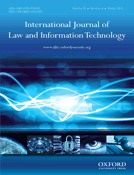
International Journal of Law and Information Technology
Advancing Scholarship at the Intersection of Law and IT.The International Journal of Law and Information Technology, published by Oxford University Press, stands as a leading forum for the exploration of the evolving intersection between law and information technology. With its ISSN 0967-0769 and E-ISSN 1464-3693, this esteemed journal has been at the forefront of academic discourse since its inception in 1993 and is poised to continue influencing the landscape of legal scholarship and information sciences until at least 2024. With a prestigious categorization in the Q2 quartile for both Law and Library and Information Sciences, the journal is prominently ranked in the 76th and 64th percentiles respectively within Scopus rankings. Offering insights on vital themes such as privacy, intellectual property, and technological regulation, the International Journal of Law and Information Technology provides a valuable resource for researchers, practitioners, and students alike, facilitating a deeper understanding of the legal challenges and opportunities presented by technological advancements. While not an open-access publication, the rigorous peer-reviewed articles serve to enrich the global academic community’s knowledge in this critical and dynamic field.